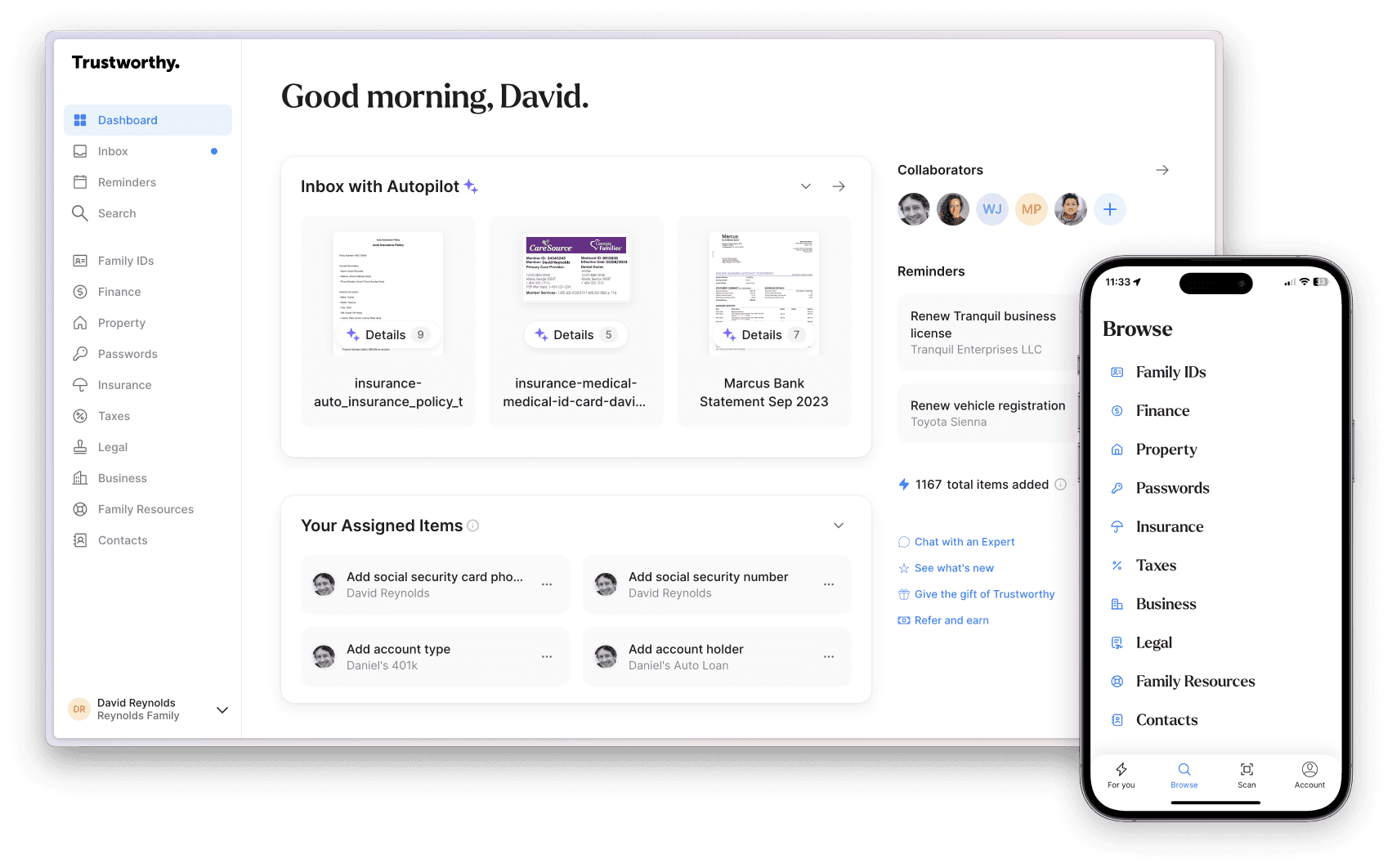There are risks when sharing confidential documents online, especially with the rise of data breaches, identity theft, and scams. You must select a secure platform to use. It’s also imperative to add protection to your documents and monitor who has access to them.
We’ve compiled a comprehensive guide on how to securely share your documents online and which platforms are the safest.
Key Takeaways
Confidential documents need protection against cyber-criminals who are after highly valuable information.
Use a platform like Trustworthy to share family documents securely and confidentially.
Add encryption, passwords, and 2FA authentication to your documents to protect your personal information.
Tips for Sharing Confidential Documents Online

Knowing how to safely share your confidential documents online is an important part of keeping them secure on whatever online platform you use. To help keep your documents safe, here are the steps you need to take.
Select a Secure Platform
The first step in safely sharing your confidential documents online is choosing a secure platform you trust. Before signing up with the provider, read their privacy policy to ensure your documents are safe.
Some good platforms include Proton Drive, Firefox Send, Google Drive, OneDrive, and Trustworthy, whose Family Operating System® combines bank-level security and tokenization for sharing family documents.
Want to learn more? How to Share Documents on Microsoft Teams
Add Protection to Documents
You must secure a document with extra protection like encryption.
Encryption ensures no one can read it without decrypting it, and a person can only decrypt it if they have a decryption key. You can use two methods: built-in encryption or an external tool like Password Protect or VeraCrypt.
Provide Access to People Who Genuinely Need It
Choosing who can access your documents ensures you only grant access to those who genuinely need it.
Giving multiple people access to your documents increases the risk of your confidential information being stolen or viewed by people without permission.
Monitor Who Has Access
Keep an eye on who has access to your confidential documents. When providing access, be aware that nothing stops them from passing details on to someone else. Monitor who has access to your documents to avoid a security risk.
Why Do Confidential Documents Need Extra Protection?
Confidential documents contain sensitive information like your physical addresses, medical details, personal details and financial information. They’re highly sought-after by cyber criminals and even businesses wishing to collect your data illegally.
Kris Lahiri, the chief security officer of Egnyte, a software company in Mountain View, California, warns: “The frequency and scale of cyber-attacks have continued to skyrocket, along with the financial toll and damage.”
To keep your documents protected, you will need to increase their security and ensure that wherever you're sharing them is secure. Unfortunately, data breaches are common and can be a hassle for those affected.
They can result in your personal information being stolen, cloned, sold to others, or even used as blackmail. This can cause extreme stress and be a long and costly process to rectify.
Even if you know how to use the internet properly, take the extra steps to secure your confidential documents.
8 Platforms to Share Confidential Documents Online

Here is our list of recommended platforms to share your confidential documents online.
Trustworthy
Trustworthy is a family operating system designed to keep your important and confidential documents organized in one place while keeping them safe with bank-level security. Users can invite family members or professionals to view their documents on the platform with all-access and limited-access permissions.
Custom plans created just for you
Customizable collaboration levels
Advanced security measures like SOC 3 certification and (AES) 256-bit encryption standard
Default 2-factor authentication
Biometric authentication
Free trial
Trustworthy has a special feature where users can share access to sensitive data with secure links and then revoke this access.
Proton Drive
Proton Drive is a reputable online storage cloud service offering users peace of mind with its end-to-end encryption.
All your confidential documents are fully secure on this platform. The company is based in Switzerland. It has one of the strictest data privacy laws in the world, so you know your documents are in good hands.
30-day money-back guarantee if you are unhappy
Plenty of platform support
Secure platform
Box
Box is a cloud storage management business with some excellent security features.
Cybercrime is becoming increasingly common, which is why Box has intelligent data leak prevention designed to identify potential threats and keep your documents safe.
You have full control of the encryption of your files
Third-party integrations
Strong security and FIPS 140-2 Certified
WeTransfer
Founded in 2009 in the Netherlands, this Dutch platform is a popular site people trust with their confidential documents because of how quickly users can upload and share files on their system.
Quick uploading and sharing
Two-factor authentication and data encryption
Dropbox
Dropbox is another platform people use to share confidential documents because it is safe and easy to use. It lets you monitor who can access your documents by tracking viewer history.
Dedicated security team
Easy to use
Has a free and paid version
Google Drive
So many people are now using Google systems for personal and business use, and sharing confidential documents. Sharing your documents on Google Drive is convenient if you use other apps like Gmail.
Free storage up to 15 GB
Friendly user interface
Compatible with Microsoft
Easy sharing
OneDrive
If you prefer using Microsoft over Google systems, we recommend sharing documents on Microsoft's OneDrive, which comes with Microsoft Office Suite.
Pros:
Excellent security. For example, files have 256-bit AES encryption
Control over access
Easy to use
FileWhopper
FileWhopper is a good choice if you're sharing multiple large documents. There is a one-time fee and no subscription.
Fast and limitless uploading
No monthly fees
Good security with encrypted files
7 More Tips for Sharing Confidential Documents Online

Keep your confidential documents safe and secure when sharing them online by increasing security measures. Ensure all software is current, and stay educated on the latest cybercrime trends. Here are seven additional tips for sharing documents online.
Ensure End-to-End Encryption
Use end-to-end encryption on your documents, which is one of the most secure security measures.
This means no third party can read the documents during a file’s journey from the sender to the receiver. This includes Google, your communication system provider, or the platform you share files on.
Use a Privacy-Focused Service
When choosing which file-sharing platform to use, pick one focused on privacy. While all file-sharing platforms advertise a focus on security, some have stronger security systems than others.
For example, some platforms may focus on faster download and upload speeds with security blind spots.
Turn on 2FA If Applicable
Two-factor authentication (2FA) is a common identity access security method many platforms use. This type of security measure is more than just a simple password and username combination.
You have two sets of security measures you need to unlock. For example, once you input your password, you'll receive a one-time code via email or mobile, which you’ll need to input to gain access to the document.
Use Password Protect Files If Applicable
Protect your confidential documents by creating a strong password so only those with the password can open your documents.
Most tools, like Adobe Acrobat (for PDFs) and Microsoft Suite, have this feature built-in and are quite simple to use. Be sure to choose a strong password that doesn’t contain obvious things like your name.
Train All Users on Cybersecurity Best Practices
Remain ahead of the latest trends happening within the cybercrime world. This is how you stay prepared. If you share files with many users on a platform, ensure all users are trained on cybersecurity best practices.
You don't need to be a tech guru to learn. It’s as simple as knowing what a phishing scam looks like and being careful about what you click on.
Control Who Has Access
One of the best ways to keep your confidential documents safe online is by controlling who has access to them. Depending on what platform you're using, there may be limits to users, which can help you keep control of access.
Otherwise, you can use the old-fashioned method of writing a list of users needing the information.
Keep Software Up to Date
Lastly, keeping your software up to date is an excellent way of ensuring your documents remain safe. Security systems might not work as well or are not up to the latest industry standards if the software is outdated. File-sharing platforms often update their systems, which is why you should consider using one of them.
Frequently Asked Questions
What is the safest way to send confidential documents?
The safest way to send confidential documents online is through a platform like Trustworthy.
How do I send a secure file via email?
While email is not the most secure way to send a file, you can protect your file by encrypting it and adding a password.
How do I share a password-protected file?
You can share a password-protected file on any platform of your choice. Just be sure you give the receiver the password (ideally through in-person or a phone call) so they can open it.
How do I send a PDF with a password-protected email?
You can password-protected emails on Outlook and Gmail by selecting the Options menu, selecting Encrypt, and choosing the option most suited to you.
Is Gmail secure to send documents?
Gmail has an option allowing you to send emails in confidential mode, so only those with access can open confidential emails.
We’d love to hear from you! Feel free to email us with any questions, comments, or suggestions for future article topics.
Trustworthy is an online service providing legal forms and information. We are not a law firm and do not provide legal advice.












